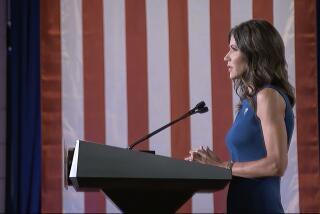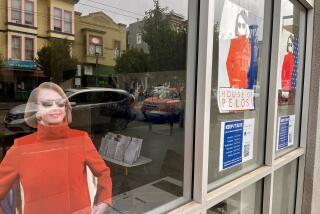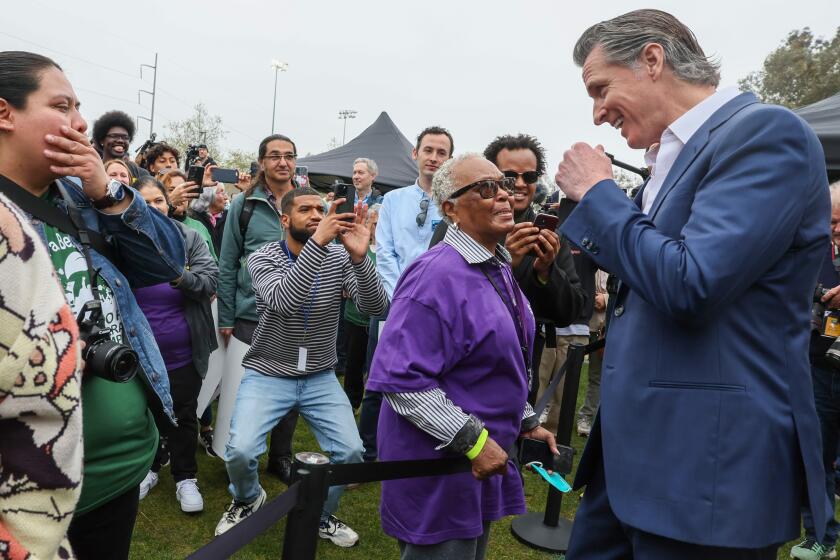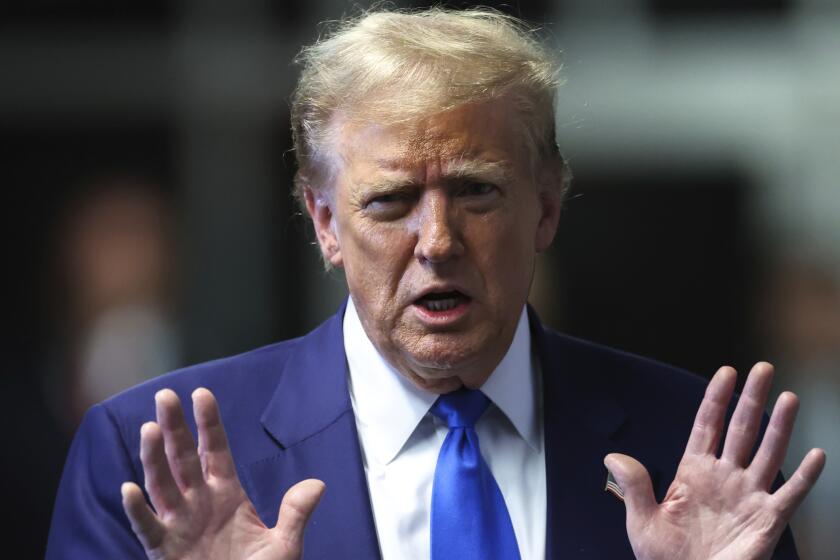Simon Suspends Campaigning, Keeps Delegates
Two days short of a year after he said he would announce his candidacy for President, Illinois Sen. Paul Simon suspended his campaigning Thursday, with “no regrets” about his presidential bid, and “no illusions that the nomination will come my way.”
Simon, by not withdrawing outright, holds on to his delegates--about 170--including 47 at-large Illinois delegates coming his way next month who would otherwise have been awarded to rival Jesse Jackson, who finished second to Simon in the Illinois primary.
Jackson Reacts
Jackson denounced the move, but Simon denied that he was part of any stop-Jackson effort.
“In a year that has already seen many surprises, no one knows what twists and turns may develop” before the July 18 Democratic convention in Atlanta, he told reporters in the Senate budget committee hearing room, which was jammed with Simon supporters, many of them wearing Simonesque bow ties in tribute.
“I owe something to those delegates, and I also frankly want to have an impact on what happens,” said Simon, who plans to meet with them after June 7 to decide his next step.
“I want to make sure that this country does what it ought to do,” said Simon, sounding both like the college teacher he once was, and the model of moral rectitude he became in a Democratic campaign tarnished by accounts of womanizing and plagiarism.
Simon’s campaign endured a year of political wind-shears that took him from being a curiosity in a bow tie, lifted him briefly to front-runner status before the Iowa caucuses, gave him his sole victory in Illinois, dashed him to last place in 11 Super Tuesday states, and finally, to a scant 5% in Wisconsin this week.
The veteran legislator said Thursday that he and fellow Illinoisan Jackson “have developed a closer relationship” during the primary campaign, and Simon was “sure” his action would not be seen “as a stop-Jackson effort.”
‘Less Than Honorable’
But Frank Watkins, Jackson’s national political director, did perceive the action as “obviously a stop-Jackson effort,” and Jackson told reporters that it was less than honorable of Simon to retain the 47 Illinois at-large delegates.
“The honorable thing to do is to do as (Rep. Richard A.) Gephardt has done,” Jackson said, referring to Gephardt’s full-bore withdrawal, freeing his delegates. Simon “has earned the delegates he has earned. But it is not right to use a cute technicality and block the at-large delegates” from being transferred to himself, Jackson said.
“Forty-seven delegates does not a stop-anybody movement make,” said Simon campaign director Brian Lunde. Simon’s decision “has to do with keeping your word to people, something Paul Simon knows a lot about.”
And indeed, in an effort short on cash and charisma, integrity was one thing Simon offered in abundance. It drew even some Republicans, like retired Wisconsin dairy farmer Harley Beilfuss, who said: “I think he’d be the most honest one of all.”
“I’m not the best financed campaign,” Simon often said in recent months. “I’m not the best-looking candidate,” he would remark drolly. “I’m not the best orator in the campaign.”
So what, then, did he offer?
Offers Unique Mixture
Simon, a U.S. senator with a listed home phone number, offered his own mixture of populist liberalism, nearly three decades of government know-how, and a rooted conviction that government is “not the enemy,” but an agent for making a “vast difference in the lives of millions.” At a Seder dinner with a Milwaukee rabbi, Simon remarked: “In a strange way, people do come to people in public life as they do to their rabbis.”
Simon campaigned for education, jobs and long-term health care, winning over many students and senior citizens in the process. But in spite of his pro-balanced budget stand, Simon’s program sounded alarmingly like higher taxes to many, and where the money would come from was a frequent question from audiences at Simon gatherings.
The road to Thursday’s suspension began as early as last December, said a senior staff member, when criticism crystallized that “the (budget) numbers didn’t add up.”
Then, Gary Hart re-entered the race, siphoning press attention.
Simon’s dismayingly close second place in Iowa robbed him of headline-momentum he needed for New Hampshire, where he placed third. And he was sidelined for Super Tuesday by dwindling fund raising.
“With the little bit of money he had, and no name recognition, he had to get a really fast start in Iowa, and he didn’t, and I think that did it,” said Gary Orfield, a University of Chicago political science professor, and a losing Simon alternate delegate.
Pressured by Backers
Simon was said to be ready to quit the race after New Hampshire, and again after his loss in Minnesota. But he stayed on after Illinois party figures pressed him to keep his commitment to his delegates, and thus keep himself--and them--with one hand on the political lever.
“Some people say the ward heelers in Chicago pushed him into it,” said Rep. Richard J. Durbin (D-Ill.), a Simon colleague for decades. “It went way beyond that. People have been loyal to Paul for years and years--nothing to do with political organizations. They put their reputations on the line. They stuck by him, and he stuck by them.”
Simon’s contributions were small, a lot of them churchplate-sized, and from Illinois. A goodly chunk more came from New York, where Rep. Stephen J. Solarz was an ardent Simon fund-raiser. According to an aide, Solarz will now back Massachusetts Gov. Michael S. Dukakis.
Simon’s campaign debt is about $500,000, said spokesman Terry Michael.
Simon’s thrifty, close-range “retail” campaigning, which in 28 years of politicking took him into living rooms and bowling alleys all over Illinois, was ill-suited to presidential-scale campaigning.
Introduces Rival’s Father
Simon could be running late on the way to address 100 people, and would pause to shake two hands. He stopped a radio talk-show to make sure one caller, near tears over pension worries, called his office for help--something he has often done. At an important labor address in Kenosha, he interrupted his own big finish to point out his rival’s father, Albert Gore Sr., in the audience.
His GI-days posture and his pump-handle gestures often looked awkward. But he refused to adapt to hit-and-run TV campaigning, deploring its insubstantial flash. “Not on it, not on it, sorry,” he said, missing sure news-play when photographers begged him to jump aboard a “chopper” at a Harley Davidson factory.
He dismayed some advisers by refusing to modify image or techniques; in his political life, Simon had lost only one election, and figured he knew better than so-called “spin doctors,” staffers say. “If that was the price to win,” Durbin said, “he wouldn’t pay that price.”
He could rise to eloquence, but his complex syntax and crafted anecdotes did not lend themselves to TV sound “bites,” and thus limited his network exposure at a time when there was little money for TV ads.
‘60-Second World’
“He needs an hour in a 60-second world,” said a senior campaign staffer, more glibly than his boss would.
Even people who liked Simon did it with a “Simon, but . . . “
Kenosha Lutheran pastor Jack Ottoson finally opted for Dukakis: “When I went into that booth, my primary criterion is, who can beat George Bush in November? . . . It’s not whether Paul Simon would be a good President but whether he could get to be President at all. It’s a real tearing experience; you’d like to vote your heart and yet at the same time you have to be practical.”
Ultimately, “We weren’t just all message like Jackson and we’re not all money like Dukakis, and both those reasons can keep you in the race forever,” said the senior Simon staffer. “We just had a stable, solid person who may just not be entertaining enough or couldn’t sustain the effort financially.”
More to Read
Get the L.A. Times Politics newsletter
Deeply reported insights into legislation, politics and policy from Sacramento, Washington and beyond. In your inbox three times per week.
You may occasionally receive promotional content from the Los Angeles Times.







